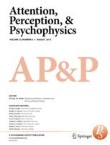
Abstract
Visual search may be disrupted by the presentation of salient, but irrelevant stimuli. To reduce the impact of salient distractors, attention may suppress their processing below baseline level. While there are many studies on the attentional suppression of distractors with features distinct from the target (e.g., a color distractor with a shape target), there is little and inconsistent evidence for attentional suppression with distractors sharing the target feature. In this study, distractor and target were temporally separated in a cue–target paradigm, where the cue was shown briefly before the target display. With target-matching cues, RTs were shorter when the cue appeared at the target location (valid cues) compared with when it appeared at a nontarget location (invalid cues). To induce attentional suppression, we presented the cue more frequently at one out of four possible target positions. We found that invalid cues appearing at the high-frequency cue po sition produced less interference than invalid cues appearing at a low-frequency cue position. Crucially, target processing was also impaired at the high-frequency cue position, providing strong evidence for attentional suppression of the cued location. Overall, attentional suppression of the frequent distractor location could be established through feature-based attention, suggesting that feature-based attention may guide attentional suppression just as it guides attentional enhancement.



Δεν υπάρχουν σχόλια:
Δημοσίευση σχολίου
Σημείωση: Μόνο ένα μέλος αυτού του ιστολογίου μπορεί να αναρτήσει σχόλιο.